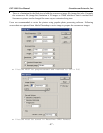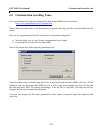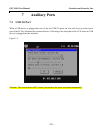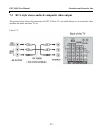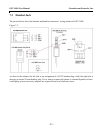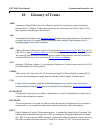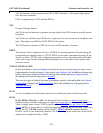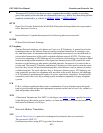
GXV-3000 User Manual Grandstream Networks, Inc.
- 59 -
An FXO interface will accept calls from FXS or PSTN interfaces. All countries and regions
have their own standards.
FXO is complimentary to FXS (and the PSTN).
FXS
Foreign eXchange Station
An FXS device has hardware to generate the ring signal to the FXO extension (usually an ana-
log phone).
An FXS device will allow any FXO device to operate as if it were connected to the phone com-
pany. This makes your PBX the POTS+PSTN for the phone.
The FXS Interface connects to FXO devices (by an FXO interface, of course).
DHCP
The Dynamic Host Configuration Protocol (DHCP) is an Internet protocol for automating the
configuration of computers that use TCP/IP. DHCP can be used to automatically assign IP ad-
dresses, to deliver TCP/IP stack configuration parameters such as the subnet mask and default
router, and to provide other configuration information such as the addresses for printer, time
and news servers.
ECHO CANCELLATION
Echo Cancellation is used in telephony to describe the process of removing echo from a voice
communication in order to improve voice quality on a telephone call. In addition to improving
quality, this process improves bandwidth savings achieved through silence suppression by
preventing echo from traveling across a network.
There are two types of echo of relevance in telephony: acoustic echo and hybrid echo. Speech
compression techniques and digital processing delay often contribute to echo generation in
telephone networks.
H.323
A suite of standards for multimedia conferences on traditional packet-switched networks.
H.264
H.264, MPEG-4 Part 10, or AVC, for Advanced Video Coding, is a digital video
codec
standard which is noted for achieving very high data compression
. It was written by the ITU-T
Video Coding Experts Group (VCEG) together with the ISO/IEC Moving Picture Experts
Group (MPEG) as the product of a collective partnership effort known as the Joint Video Team
(JVT). The ITU-T H.264 standard and the ISO/IEC MPEG-4
Part 10 standard (formally,
ISO/IEC 14496-10) are technically identical. The final drafting work on the first version of the
standard was completed in May of 2003.



